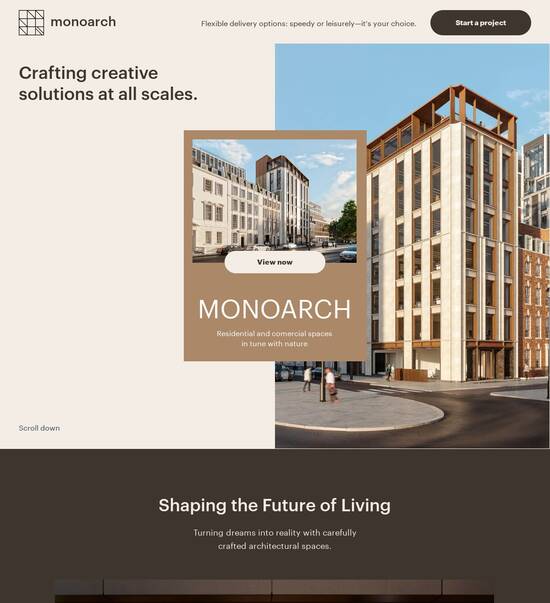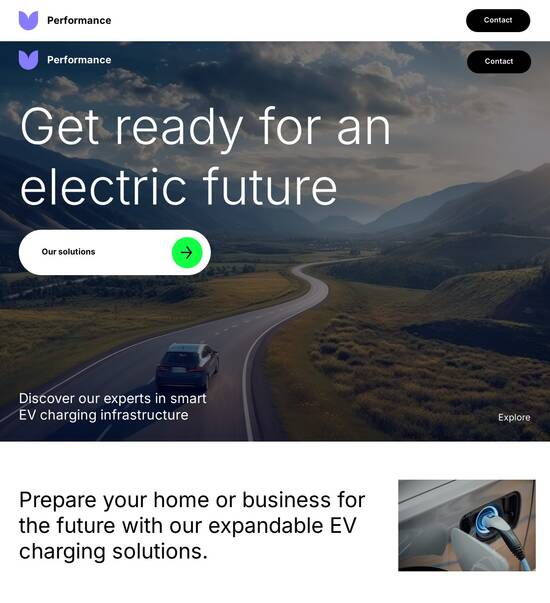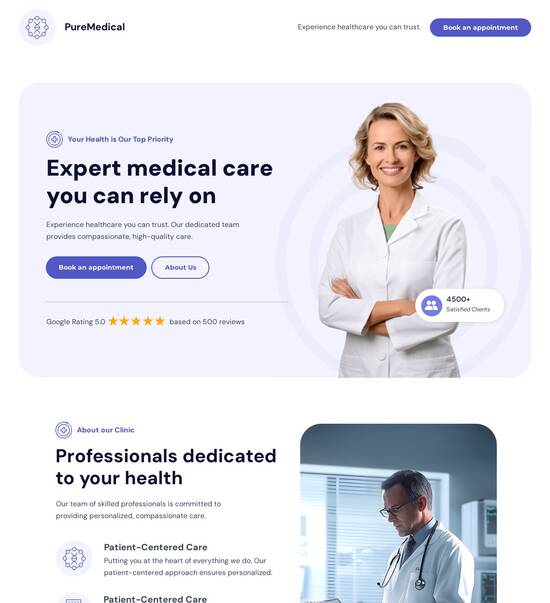
HTML page template for pottery stores
Use TemplateAbout template
Showcase your products with stunning landing page templates for your pottery stores. Ready to boost those sales?
Recommended templates

Easy to build without coding
With the intuitive drag-and-drop builder, anyone on your team can create high-converting pages without any knowledge of code or design. Make enhancements to your landing page with custom widgets using Javascript, HTML/CSS, or third-party scripts.

Multiple layouts for any industry and goal
Select from 500+ landing page layouts built to boost conversions across industry-specific scenarios. Customize them by adjusting fonts, adding images, and generating on-brand content with the AI assistant. Quickly scale with Instablocks® and Global Blocks that you can save, reuse, and update globally.

Loads fast and looks polished on any device
Every template is responsive, which means they present professionally on any device and load blazingly fast with our Thor Render Engine. You can also power them up with Google AMP technology to deliver an unparalleled mobile experience and drive higher conversions.

Robust analytics & experimentation
Get real-time updates and reporting across all your devices, showing the number of visitors, conversions, cost-per-visitor, and cost-per-lead. Launch AI-powered experiments, run A/B tests, and use heatmaps to analyze user behavior, then optimize your landing page to maximize conversions.







Easy to build without coding
With the intuitive drag-and-drop builder, anyone on your team can create high-converting pages without any knowledge of code or design. Make enhancements to your landing page with custom widgets using Javascript, HTML/CSS, or third-party scripts.
Multiple layouts for any industry and goal
Select from 500+ landing page layouts built to boost conversions across industry-specific scenarios. Customize them by adjusting fonts, adding images, and generating on-brand content with the AI assistant. Quickly scale with Instablocks® and Global Blocks that you can save, reuse, and update globally.
Loads fast and looks polished on any device
Every template is responsive, which means they present professionally on any device and load blazingly fast with our Thor Render Engine.
Robust analytics & experimentation
Get real-time updates and reporting across all your devices, showing the number of visitors, conversions, cost-per-visitor, and cost-per-lead. Launch AI-powered experiments, run A/B tests, and use heatmaps to analyze user behavior, then optimize your landing page to maximize conversions.
All the features you need to build lead-generating landing pages
Explore more featuresLearn how to build top-performing landing pages for any goal
FAQs
Leading the way in building high-performing landing pages





A comprehensive guide to maximizing conversions with Instapage
Instapage offers the most powerful landing page and conversion rate optimization (CRO) tools tailored for marketing teams across various sectors in the USA. With access to over 100 ready-to-use templates, marketers can quickly launch high-converting landing pages enhanced by detailed analytics and personalization features to increase ROI.
Understanding the importance of landing pages
Landing pages serve as crucial touchpoints for capturing leads and driving sales. They focus on single conversion goals, guiding visitors through the purchasing process without distractions. Utilizing Instapage's flexible page builder, marketers can create customized experiences that resonate with their target audience.
- Increased conversions: Focused messaging leads to higher conversion rates.
- Improved user experience: Landing pages provide a seamless journey tailored to user needs.
- Data-backed decisions: Analytics and A/B testing enable better decision-making and optimizations.
Step 1: Choose the right template
Selecting a template that aligns with your brand and campaign objectives is crucial. Instapage offers a variety of professionally designed templates that are proven to convert. Consider the following in your selection process:
- Identify your goal: Choose a template designed for lead generation, sales, or signups.
- Audience relevance: Ensure that the design and messaging resonate with your target audience.
- Customization options: Look for templates that allow you to easily integrate your branding and content.
Step 2: Optimize your landing page
Once your template is selected, optimization for conversions is vital. Instapage provides built-in tools to enhance your page's performance. Focus on these critical aspects:
- A/B testing: Experiment with different versions of your page to find what works best.
- Heatmaps: Analyze user behavior to understand where to focus your improvements.
- Load speed: Ensure your page loads quickly to minimize bounce rates.
Step 3: Personalize user experiences
Effective personalization can significantly boost engagement. With Instapage's dynamic text replacement and audience metrics, marketers can tailor their content to meet diverse audience needs. To achieve this:
- Dynamic content: Use audience data to customize headlines and CTAs for specific segments.
- Ad alignment: Match your ad copy with landing page themes for a cohesive journey.
- Performance tracking: Continuously assess metrics to refine your personalized strategies.
In conclusion, utilizing Instapage empowers businesses in various industries to create high-performing landing pages that enhance user experience and drive successful outcomes.
Start transforming your digital marketing strategy today with Instapage's comprehensive capabilities. Join the ranks of marketers who maximize ROI with purpose-driven landing pages.
People also ask about HTML page template for pottery stores
HTML page templates for pottery stores: A practical guide
Understanding HTML page templates: A gateway for pottery stores
HTML page templates serve as the foundational building blocks for any website, including those designed for pottery stores. These templates enable store owners to create attractive, functional pages without the need for extensive coding knowledge. By utilizing HTML templates, pottery stores can ensure that their online presence aligns with their brand's visual identity, thereby enhancing overall customer engagement.
The role of HTML page templates in e-commerce
HTML page templates are pre-designed structures featuring HTML, CSS, and occasionally JavaScript, providing the essential layout and functionality for a website. For pottery stores, these templates play a critical role in establishing a consistent brand image that reflects the artistry of their products. Through effective use of color, typography, and visuals, HTML templates allow store owners to showcase their craftsmanship and unique offerings.
Defining HTML page templates provides a clear understanding of how they function.
Utilizing templates helps streamline the design process without sacrificing creativity.
For pottery stores, the e-commerce specifics cater to their unique needs by focusing on visual storytelling. Pottery is inherently a visual craft, and HTML templates should prioritize aesthetics to enhance customer experiences. This involves showcasing the beauty and intricacy of pottery designs through high-quality images and detailed product descriptions.
Key features of pottery store HTML page templates
When selecting HTML page templates for pottery stores, certain features stand out as essential for success. Responsive design is crucial, as it ensures that the website looks great on all devices, from desktops to smartphones. This adaptability positively impacts user engagement and can significantly increase sales conversions, as customers often browse on mobile devices.
Responsive design creates an optimal viewing experience across various devices.
Customization options allow stores to align with their unique aesthetics.
SEO-friendly structure helps boost visibility on search engines.
Built-in product galleries facilitate engaging displays for pottery items.
Responsive design is just one key feature that can dramatically elevate a pottery store's online presence. Templates with ample customization options allow store owners to tweak colors, fonts, and layouts that resonate with their unique pottery aesthetics. Furthermore, an SEO-friendly structure integrated into HTML templates helps ensure that the website ranks well in search engine results, driving more traffic to the store. Built-in product galleries also play a vital role in displaying pottery in an attractive manner, further enhancing the user's browsing experience.
Utilizing JavaScript to enhance HTML functionality
JavaScript enhances the functionality of HTML templates by adding interactivity and improving user experience. It's essential to integrate this scripting language into the pottery store template for features such as interactive product galleries or shopping carts. By employing JavaScript effectively, stores can manage user interactions in real-time, creating a seamless shopping experience.
JavaScript is vital for adding interactive elements to HTML templates.
Utilizing 'document.addEventListener' improves event handling in web applications.
Listening for 'DOMContentLoaded' ensures stability in template loading.
Engaging user interactions can be enhanced with dynamic features like animations.
To illustrate, using the `document.addEventListener` method allows for more efficient event handling, which is particularly useful for features like responsive pottery carts. Similarly, listening for `DOMContentLoaded` events can significantly improve page loading speeds, ensuring that customers enjoy instant access to your pottery offerings. By incorporating JavaScript to animate pottery showcases during page loads, stores can capture user interest and enhance engagement further.
Crafting a pottery store aesthetic with HTML templates
Creating an aesthetic that captures the essence of pottery involves careful consideration of visual elements. Color palettes should echo natural clay tones and glaze hues, while typography must reflect the artisanal charm of handcrafted pottery. By harmonizing these components within the HTML template, pottery stores can build a visual identity that strongly resonates with customers, sparking their interest and trust.
A color palette that resonates with natural pottery elements enhances visual impact.
Typography choices should reflect the artisanal craftsmanship.
Integrating multimedia elements can effectively showcase the pottery-making process.
User-friendly navigation simplifies the browsing experience for potential buyers.
Additionally, integrating multimedia elements, such as video backgrounds that showcase the pottery creation process, can engage visitors more deeply. Proper video optimization is essential for maintaining fast loading times while delivering an immersive experience. User-friendly navigation features, such as sticky headers and well-defined categories for different pottery types, also contribute to a smooth shopping experience, enabling customers to find their desired items easily.
Conversion rate optimization for pottery websites
Effective landing pages play a crucial role in boosting conversion rates for pottery websites. Studies show that an engaging and visually appealing landing page can lead to increased sales. Pottery stores should prioritize making their landing pages visually impactful while clearly conveying their unique offerings to potential buyers.
Landing pages should be designed with clear calls to action that resonate with visitors.
A/B testing different layouts can provide insights for maximizing user retention.
Utilizing heatmaps can help inform design choices based on user behavior.
Addressing common visitor concerns through FAQs establishes trust with customers.
Strategically implementing A/B tests on different layout designs can uncover what works best for your audience, ultimately maximizing user retention. Additionally, using heatmaps to analyze user behavior can guide design improvements and enhance conversion effectiveness. Providing answers to frequently asked questions on pottery durability can proactively address concerns and instill confidence in the purchasing process.
Case studies: Successful pottery stores using custom HTML templates
Examining successful pottery stores that have effectively used custom HTML templates offers valuable insights. One notable example is a small-footprint pottery studio that implemented a clean and aesthetically pleasing template design. Their growth metrics post-template integration demonstrated noticeable improvements in sales and customer engagement.
The small-footprint pottery studio saw improved sales with updated template designs.
An artisan pottery marketplace successfully collaborated with multiple vendors using customized templates.
A national pottery retailer utilized mobile-first designs to capture customer attention.
Another example is an artisan pottery marketplace where various creators collaborated, utilizing tailored templates that enhanced their unique sales strategies. Metrics revealed significant improvements in sales and customer interactions in this multivendor setup. Lastly, a national pottery retailer embraced mobile-first designs, which positively impacted traffic and sales dynamics, proving the importance of having adaptable and user-friendly templates in place.
Tools and resources for creating HTML page templates
Developing effective HTML templates requires the right tools. Basic tools like code editors, including Visual Studio Code and Sublime Text, are essential for writing and editing HTML, CSS, and JavaScript. Furthermore, version control systems like Git help manage changes and collaborations throughout the development process.
Code editors provide an intuitive workspace for developers to create and modify HTML.
Version control systems facilitate collaboration among multiple developers.
CSS frameworks like Bootstrap or Tailwind CSS streamline responsive design.
Image optimization tools help improve image quality without slowing down loading times.
In addition to code editors, CSS frameworks like Bootstrap and Tailwind CSS can simplify responsive design, making it easier to create visually appealing layouts. Image optimization tools are also crucial for pottery stores, as high-quality images must load quickly to maintain user engagement. By choosing appropriate formats, such as WebP or JPEG, store owners can enhance visual appeal while ensuring fast load times.
The future of e-commerce HTML templates in pottery websites
Looking ahead, the landscape of HTML templates used in pottery websites will continue to evolve with emerging trends. One exciting trend is the increasing adoption of AI-driven personalization, which allows for tailored shopping experiences based on user preferences. Predictions also suggest that augmented reality (AR) will play a significant role, enabling customers to virtually try out pottery items before making a purchase.
Rising trends in AI-driven personalization offer unique user experiences.
AR technology could revolutionize the way consumers interact with pottery products.
Sustainable practices in web development will become increasingly important for brand reputation.
Moreover, sustainable practices in website development will take center stage as consumers become more concerned about environmental impacts. Staying updated with energy-efficient hosting and coding practices will enhance brand reputation within a conscientious marketplace. By being mindful of these emerging trends and technologies, pottery websites can stay ahead of the curve.
Final thoughts on implementing HTML templates for pottery stores
Maintaining and updating HTML templates is essential for long-term success. Regularly refreshing content and visual elements helps keep a store's offerings relevant and engaging. Additionally, ongoing updates of security features are pivotal to protecting customer information and ensuring a safe shopping environment.
Long-term maintenance of templates ensures relevance and customer engagement.
Regular updates of security features protect customer data.
Adapting to evolving consumer preferences can drive continuous improvement.
Meanwhile, adapting to evolving consumer preferences is key for continuous improvement. Listening to user feedback provides valuable insights, allowing store owners to refine their HTML templates over time. With a focus on integrating emerging technologies into existing designs, pottery stores can ensure they remain competitive while catering to their audience's needs.
Ready to skyrocket conversions?
Supercharge your ad campaigns with high-performing landing pages
Get started














